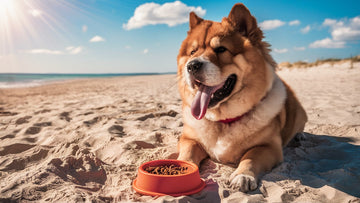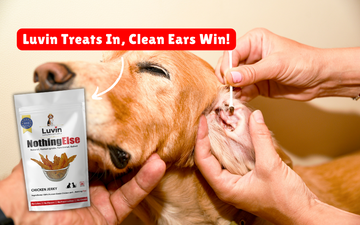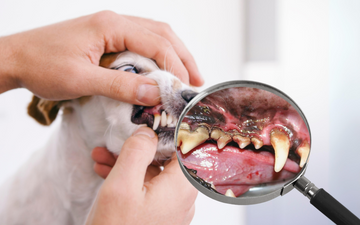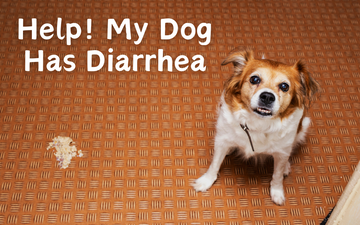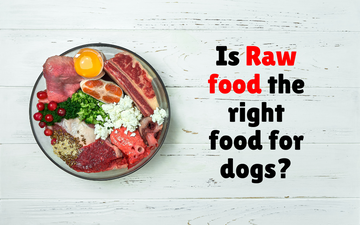
Is Raw food the right food?
Raw food is gaining a lot of popularity nowadays. You hear so many pet parents, nutritionists, and veterinarians talking about it and discussing the potential advantages and disadvantages of raw dog food.
Let us gather everything and let you decide what is best for your pooch.
What is raw food?
If you are new to the party, raw food as the name suggests, consists of uncooked ingredients. These diets typically include muscle meat (sometimes still on the bone), bones (whole or ground), organ meats like liver and kidney, raw eggs, raw fruits, vegetables, and even some dairy products like unpasteurized yogurt or milk.
Advantages of raw food
When it comes to your pet's food, your goal is to provide them with a nutritionally balanced diet that fulfills every macro and micro-nutrient requirement, using the best quality ingredients to support your dog's health and overall well-being, ensuring a long and fulfilling life.
Pet parents feeding raw diets to their fido believe that they are in control of providing them with a nutritionally rich diet using the top quality ingredients and avoiding unnecessary filler, additives, and preservatives, but are they able to fulfill their dog’s every nutrient requirement however small it is?
Pet parents believe that raw diets are responsible for a dog's shiny, healthy coat and improve any pertaining skin conditions. While we are here discussing healthy coats we can touch on the topic of allergies and food sensitivities as raw diets are believed to be the solution for dogs with food allergies or sensitivities, believing that a simpler, unprocessed diet may alleviate these issues.
Bones are an important ingredient in raw food diets rich in calcium and phosphorus but that is not all chewing on raw bones helps to clean a dog's teeth naturally, reducing the risk of dental problems like plaque and tartar buildup. It can contribute to fresher breath and healthier gums.
Some pet parents claim that their pets show high energy levels when they are on a raw food diet.
Raw food diets can lead to smaller, firmer stools, what does that indicate?
Smaller stools can indicate that the dog's digestive system is efficiently breaking down and absorbing nutrients from their food, suggesting that the dog is getting the maximum nutritional benefit from their diet.
The strongest argument in favor of raw food feeding for dogs is considered to be their evolutionary history as descendants of carnivorous ancestors who primarily consumed raw diets.
Disadvantages of raw food
It's essential to consider the other side of the coin.
While pet parents believe that they are in control of formulating the diet of their pooches, raw diets are often criticized for lacking a proper balance of macro and micronutrients. Studies have found deficiencies in zinc, calcium, phosphorus, and excessive levels of vitamins A and D in some raw diets. These imbalances can lead to health issues over time.
The World Health Organization has declared red meats carcinogenic, and potential carcinogens can be found in other meats like chicken. This raises concerns about the long-term health impact of a high-animal protein diet.
Dogs may struggle to process diets high in animal protein and develop sensitivities to these ingredients.
Bones can pose risks to your dog's safety, including choking, broken teeth, or internal punctures.
Raw food is uncooked and can harbor harmful bacteria like Salmonella and E. coli. Which can cause digestive problems and even food poisoning.
Including unpasteurized dairy products, such as milk and milk-based items that have not undergone heat treatment, is a common component of raw food diets. However, it's essential to be aware of the potential risks associated with raw milk, as it can carry various pathogenic bacteria. These harmful bacteria may include tuberculosis, diphtheria, typhoid, Campylobacter, Listeria, Brucella, E. coli, Salmonella, and streptococcal infections, which can make the consumption of unpasteurized dairy products potentially unsafe.
Handling the raw ingredients is also crucial, as improper handling can turn them into a problem rather than a solution.
So is it good or bad?
So, what's the verdict on raw dog food diets? It's a complex issue, and as of now, there's no definitive answer. While some pet owners swear by the benefits, others worry about potential health risks.
One thing's for sure, always consult your veterinarian before making significant changes to your dog's diet. Your vet is your best resource for understanding your pet's unique nutritional needs and any potential health concerns.
In conclusion, the raw food diet for dogs remains a topic of debate. While it may offer certain benefits, the risks and lack of nutritional balance raise valid concerns. Ultimately, the decision should be made in consultation with your trusted veterinarian, ensuring that your furry friend's health and well-being come first.



